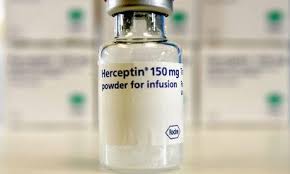Roche's Herceptin facing further biosimilar threats in US

Roche’s breast cancer blockbuster Herceptin could face further competition in the US when its patent expires in the coming years, as Amgen-Allergan and Teva-Celltrion said the FDA accepted filings for cheaper biosimilar near-copies.
With sales of around $7 billion a year, and annual US sales of $2.6 billion, Herceptin is one of a trio of big-selling Roche drugs that face cheaper competition in the coming years.
Herceptin (trastuzumab) is a monoclonal antibody targeting the HER2 receptor and is approved for HER2-positive adjuvant breast cancer, metastatic breast cancer and metastatic gastric cancer in the US.
The FDA is due to make a decision on a Herceptin biosimilar from Mylan and Biocon by early September following a glowing review by a panel of advisers, and Amgen and Allergan’s Avastin biosimilar also looks likely to be approved soon after the same panel recommended it should have a licence.
A host of other companies, led by Sandoz, are also developing biosimilar competitors to Roche’s cancer and inflammatory diseases drug, rituximab.
Amgen and Allergan are collaborating on the development and commercialisation of four oncology biosimilars. Amgen has a total of 10 biosimilars in its portfolio, one of which has been approved by the FDA.
Meanwhile, Teva has struck an alliance with South Korea’s Celltrion to develop and market biosimilars of rituximab and Herceptin for the US market.
Celltrion is one of the leaders in developing biosimilars of monoclonal antibodies, and with Pfizer was the first company to get a monoclonal antibody biosimilar approved in the US.
Due to the litigious nature of the originator companies, getting cheaper rivals to market in the US can often be problematic.
There are issues with patent law in the US that may keep biosimilars off the market for another couple of years.
US patents on Herceptin and Avastin are due to expire by 2019, but in many cases, originator manufacturers will defend their products with additional patent protections that can keep rivals at bay for longer.
However, the US Supreme Court earlier this year ruled that biosimilar manufacturers don’t have to wait for six months after approval to market their product, removing another potential delay to the launch of biosimilar competitors.











